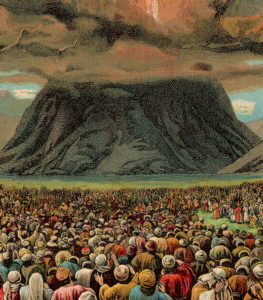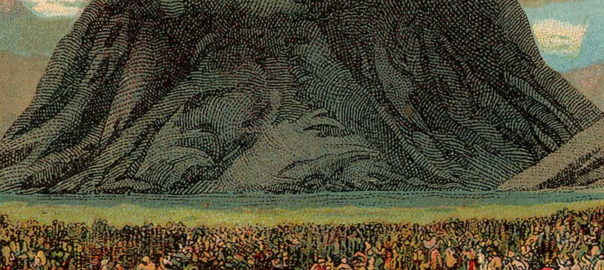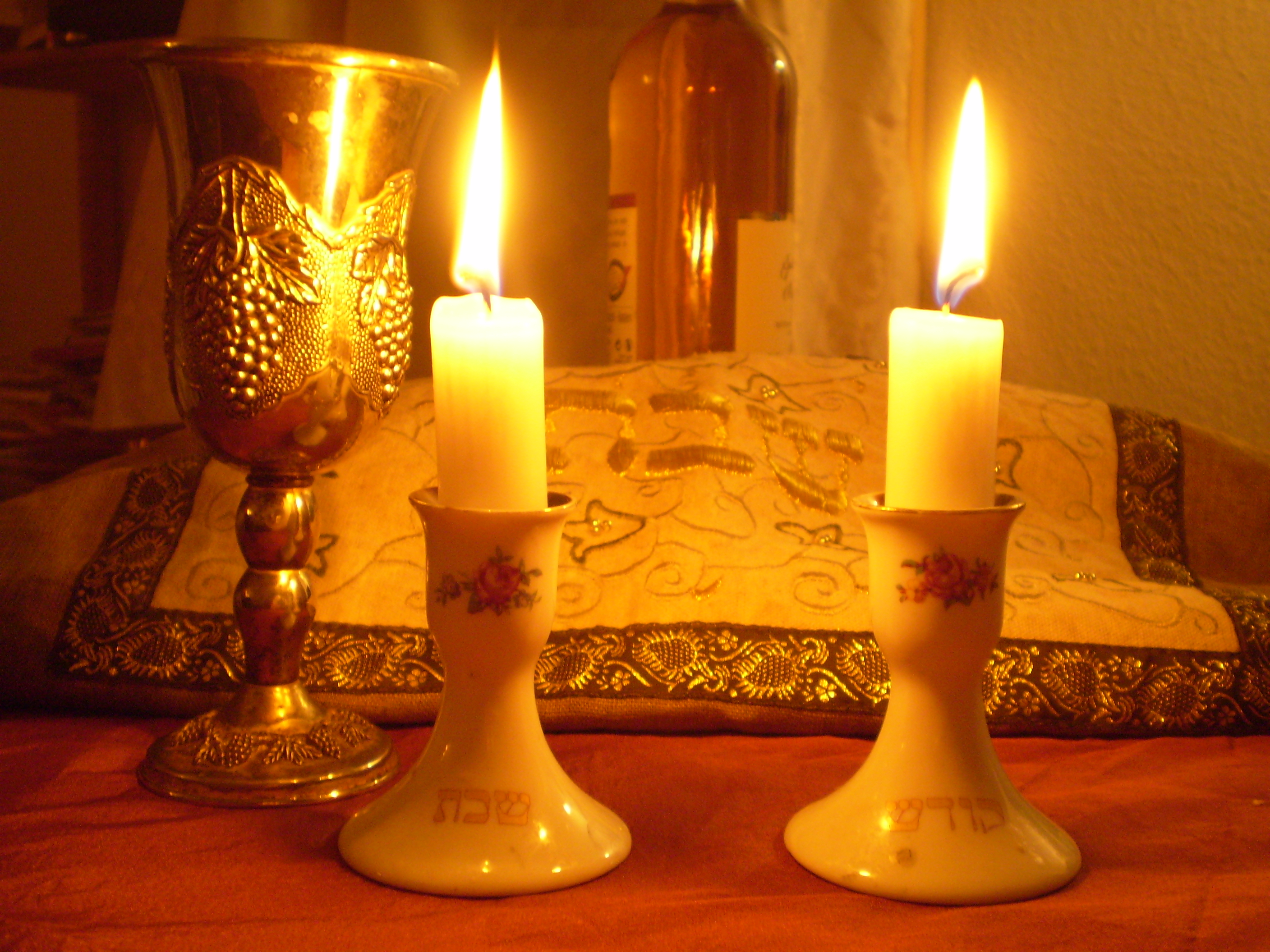There are two points of deep contact between the Jewish and Christian calendars. The first is Easter, which feels to us an amplified and distorted echo of our Passover. The second is Christmas, which… well, perhaps I should have written that there are on the Christian calendar two deep points of contact with Judaism. Because while both are characterized by Christianity’s anchoring itself in our shared past, neither is characterized by a corresponding reach from the Jewish side. Christmas derives nothing recognizable from the Jewish calendar; it echoes a longing for Judaean sovereignty, which has become as complicated for us in our way as what Christianity has done with it, but which for us has never had a particular season.
Both Easter and Christmas are strewn with broken bits of Judaica, recited like half-remembered passwords. Cultural trends in the United States have rendered Easter short and sharp while marching Christmastide relentlessly to the very doorstep of Halloween. Both processes have involved uneven attempts at cutting loose the anchor. There have been significant supporting roles for Jews in these attempts with respect to Christmas (sorry!) mainly in the area of music, so much so that the voice of secular Christmas includes a veiled Yiddish accent. Ironically, though I am a fan of secular Christmas, its music mostly leaves me cold. What I most enjoy hearing or humming along is the old stuff, the early-modern and the mediaeval. But the more of that I seek out or happen across, the more I’m confronted with the mumble-jumble: Yihudoh, Yisroel, Dovid, Imonu El, Beys Lechem, Yirusholayim, Moshiach, Pesach. Eloihiy, lomoh? Omein, Hallelu Yoh.
The blunt fact of this confrontation isn’t a surprise to me anymore, though a new example will sometimes show itself. So I sat through the first third or so of the Heartland Men’s Chorus “Kansas City Christmas” this past Saturday night, with its mix of English and Latin studded with Hebrew, and thoroughly enjoyed the music and the performance of it without giving it much thought of any depth — not even “The First Noël” with its relentless assertion that “born is the ki~ing of I~is-Rah-Yell”.
And then the men began chanting “Oiseh Sholem.”*
Some readers will have come this far and at several points asked me in absentia, “What about Hanukah?” I haven’t mentioned Hanukah because it hasn’t been relevant. Christmas isn’t to Hanukah as Easter is to Passover. Christianity depends on Christmas, while Judaism could mislay Hanukah tomorrow and barely notice. Their suspicious coincidence is most likely due to separate pagan influence on each than to either influencing the other. Their themes, too, only overlap where both touch the deeper springs of Midwinter, in the value of light in dark times and joy at the renewal of the sun.
 Because what else is Christmas about? The birth of the one who saves humanity from Hell, yes, but that tends to be left for Easter to emphasize. Christmas emphasizes Jesus’ role as the Prince of Peace. Doxa en ‘upsistois Theôi kai epi gês eirênê en anthrôpois eudokia, Gloria in excelsis Deo et in terra pax in hominibus bonae voluntatis: Honor in the highest to God, and on earth peace, among humanity goodwill. (Luke 2:14)
Because what else is Christmas about? The birth of the one who saves humanity from Hell, yes, but that tends to be left for Easter to emphasize. Christmas emphasizes Jesus’ role as the Prince of Peace. Doxa en ‘upsistois Theôi kai epi gês eirênê en anthrôpois eudokia, Gloria in excelsis Deo et in terra pax in hominibus bonae voluntatis: Honor in the highest to God, and on earth peace, among humanity goodwill. (Luke 2:14)
Shorn of a Judaean nationalism inappropriate to Christian universalism, what remains for Christmas is the utopia which Jewish prophets had attached to a someday-somehow perfect restoration of Judah’s monarchy and priesthood: the proxy-enthronement of God on earth, and the establishment of global peace through global justice.
Hanukah is about a military victory. Sure, it was a kind of Judaean “war for independence” from an empire. But its status as a milestone in the history of political or religious freedom is tainted by it also having been a kind of Judaean civil war between factions partly distinguished by religious positions — and the victors did not share the freedom they had won with the other faction. The victory resulted in a century-long restoration of an independent monarchy and priesthood, but not at all built along the lines the prophets had called for. The regime stands as an embarrassment in Jewish history, which is why “the Hanukah Story” always ends with the victory, and is probably partly why the holiday is minor.
So the impulse to ease the psychallergic reaction many Jews have to Christmas by puffing up Hanukah is something I’ve long resisted, whether done by Christians or Jews. It misunderstands Hanukah, it misunderstands difference, it misunderstands inclusion. I didn’t go to “Kansas City Christmas” with any expectation of Hanukah and, depending on the selection, might have been baffled or bothered had it been there.
But “Oiseh Sholem”… “Oiseh Sholem” isn’t Hanukah. It’s every day, repeatedly. Oiseh sholem bimroimov, hu ya’aseh sholem oleynu v’al kol Yisroel (v’imru omein): [who] makes peace in his high place, may he make peace on us and on all Israel (and we say “truly!”)
The line closes most versions of the “Kadish” prayer (including some daily ones) though that requires the presence of nine others to recite. It also closes the “Amidah” which means there are Jews saying it at least three times a day. And it stands alone as a popular all-purpose song.
It isn’t Hanukah. But it isn’t at all a random choice. There’s a distant dialogue available between it and the “Gloria,” between bimroimov and en ‘upsistois.
I wrote that the men began chanting, not because the style of their vocalization was particularly chant-like but because it was repetitive, at first repeating just those first two words. A soloist stepped forward to sing the line in its entirety, after which the whole chorus took up various longer pieces of it to repeat.
The arrangement was both immediately familiar and strange, so that I’m left with the vivid impression that I remember it clearly but when I reach for the memory almost nothing is there — except a brief invocation of the melody used for Hatikvah, which struck me at the time as one of few overtly Jewish touches in music that otherwise wasn’t out of place in a to-that-point very traditional Christmas collection.
Possibly I was too busy suddenly thinking hard, about Hebrew, about Christmas, about boundaries and what grammarians call deixis: the means available to a language for designating either side of a boundary.
Because when Jews call for peace “on us and on all Israel,” the words mean “on us [Jews here] and on all [other] Jews”. I’m not a universalist, but I am a humanist. The “Oiseh Sholem” is among a host of lines in the liturgy that call benediction for us to the exclusion of — and, indeed, sometimes in opposition to — others. I’ve been bothered by them since I understood the language clearly enough, and I have my habits of substitution: ha’oilom, for instance, “the universe”, instead of Israel. And I’m not alone in this, as I’ve more recently discovered a shared practice of adding or substituting kol yoishvey seiveil, “all dwellers of the world.”
But I was listening to a chorus of gay men, composed primarily not of Jews. The same “on us and on all Israel” from their mouths means “on us and on […] Jews”. The unaltered traditional words, quite altered in meaning. Not as blown-out “everybody over here, everybody over there” as I and others have attempted to be in our devotions, but a startling inclusion of Jews in a prayer for peace, at Christmas, letting our own language speak without getting bogged down in counter-claims about revelation and interpretation and possession.
I have no way of knowing how much of this, if any, was in mind when the song was chosen or sung, but I was touched. The Christian gaze intermittently aimed at Jews as Jews is often blind, sometimes obsessive, and usually uncomfortable at best. This was nice: both welcoming and a welcome reminder that we all need to do better. As I said, I’m not a universalist. Our benedictions for ourselves and for each other should be as different as our needs are, and matched by striving to understand and to meet those differences on their own terms. But no one should be left out of that understanding, including those whose modes don’t include prayer. Next year, kol yoishvey seiveil.
*Note: with a few exceptions, I’ve transliterated Hebrew in this post on the basis of Yiddish (aka Ashkenazi) pronunciation. It started as a way to render the words at the end of the second paragraph less familiar to the eye.




